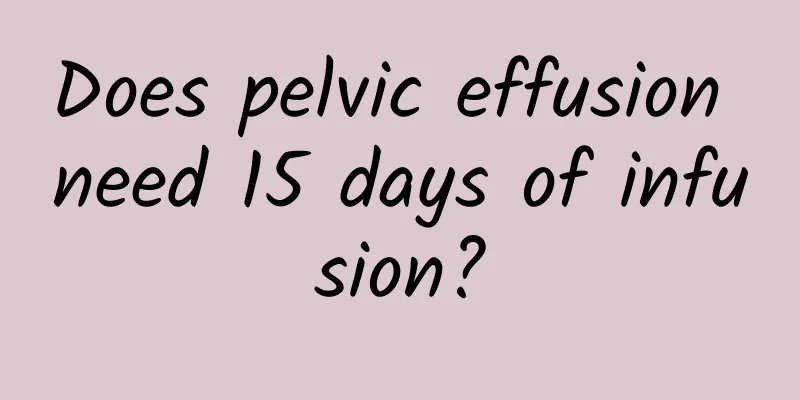Does acute pelvic peritonitis require surgery?

|
As modern life becomes more and more tense and the environment becomes more and more harsh, the incidence of pelvic peritonitis is getting higher and higher. It is a group of diseases caused by inflammation of the female upper reproductive tract, which seriously affects people's health. Therefore, the treatment of this disease is particularly important. Below I will introduce in detail whether acute pelvic peritonitis requires surgical treatment. I hope it will be useful to everyone. Does acute pelvic peritonitis require surgery? Ineffective drug treatment: If the body temperature of a fallopian tube, ovarian abscess or pelvic abscess does not drop after 48 to 72 hours of drug treatment, or the patient's poisoning symptoms worsen or the mass increases, surgery should be performed promptly to avoid abscess rupture. Abscess persists: The condition improves after drug treatment and the inflammation is controlled for several days (2 to 3 weeks). If the mass has not disappeared but has become localized, it should be surgically removed to avoid another acute attack in the future or the formation of chronic pelvic peritonitis. Abscess rupture: Sudden worsening of abdominal pain, chills, high fever, nausea, vomiting, abdominal distension, refusal to press the abdomen, or signs of toxic shock should be suspected of abscess rupture. If abscess rupture is not diagnosed and treated in time, the mortality rate is high. Therefore, once abscess rupture is suspected, laparotomy should be performed immediately while treating with antibiotics. The surgery can be performed by abdominal surgery or laparoscopic surgery according to the situation. The scope of the surgery should be comprehensively considered based on the scope of the lesion, the patient's age, and the general condition. The principle is to remove the lesion. Young women should try to preserve ovarian function and use conservative surgery as the main method; for older women, those with bilateral adnexal involvement or repeated adnexal abscesses, total hysterectomy and bilateral adnexectomy should be performed; the scope of surgery for extremely weak and critically ill patients should be determined according to the specific situation. If the pelvic abscess is located low and protrudes into the posterior vault of the vagina, it can be drained through the vagina and antibiotics can be injected at the same time. In summary, pelvic peritonitis is a difficult disease to cure. Since there are many pathogenic factors, there are also many treatment methods. Based on my many years of medical experience, I recommend surgical treatment for patients with severe illness, and I recommend using an antibacterial spectrum that covers anaerobic bacteria for patients with mild illness. As long as the above points are achieved, this disease can be treated well. |
<<: Do I need surgery for pelvic peritonitis?
>>: Does pelvic peritonitis require surgery?
Recommend
Common menstrual irregularities caused by several bad living habits
Many women attribute irregular menstruation to ma...
How to diagnose ovulation bleeding
What are the methods for checking and diagnosing ...
Eating cold rice can help you lose weight! Vegetables and fruits mixed with cold rice only 300 calories
Who says food has to be eaten hot? Have you ever ...
Poor hygiene habits can easily induce vulvar leukoplakia
Vulvar leukoplakia is also known as chronic vulva...
How to treat trichomoniasis in little girls
How to treat Trichomonas vaginitis in little girl...
What to do if uterine prolapse occurs
What should I do if I have uterine prolapse? Firs...
What are the dangers of endometrial polyps
Endometrial polyps may cause problems such as irr...
What are the early symptoms of ectopic pregnancy for female friends?
Female friends may have heard of ectopic pregnanc...
Is dysmenorrhea related to prostate hormones?
Dysmenorrhea is closely related to prostate hormo...
Clinical symptoms of ovarian tumors
What are the symptoms of ovarian tumors? What are...
Are cervical warts contagious?
When we are healthy, no one will realize the impo...
What should I do if my period doesn’t come after a miscarriage?
What should I do if my period doesn’t come after ...
Don't get into the misunderstanding of cervical erosion
What people often call cervical erosion is actual...
What are the triggering factors of pelvic inflammatory disease in daily life?
The triggering factors of pelvic inflammatory dis...
Introduce the main knowledge of cervicitis care
Cervicitis is a disease with a high incidence rat...









